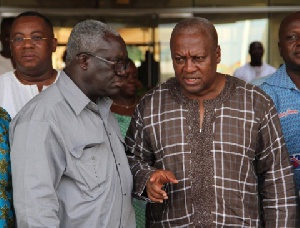- Home - News
- TWI News | TV
- Polls
- Year In Review
- News Archive
- Crime & Punishment
- Politics
- Regional
- Editorial
- Health
- Ghanaians Abroad
- Tabloid
- Africa
- Religion
- Election 2020
- Coronavirus
- News Videos | TV
- Photo Archives
- News Headlines
- Press Release
Business News of Tuesday, 17 March 2015
Source: B&FT
Labour insists on right to strike
Secretary-General of the Trades Union Congress (TUC) Kofi Asamoah has reiterated Labour’s stance that it will resist any intervention from the International Monetary Fund (IMF) that will worsen the plight of Ghanaian workers.
Early last month (February), government concluded most of the outstanding issues concerning negotiations with the IMF, and the country is set to receive US$940million which is to be considered by the IMF Executive Board in early April.
The three-year programme will be rolled-out once the board of the IMF endorses it.
The three pillars of the IMF deal commonly referred to as ‘conditionalities’ are: to restrain and prioristise public sector spending, increase tax collection, and strengthen the effectiveness of the Bank of Ghana’s monetary policy role.
Kofi Asamoah notes that whenever the IMF comes into the economy, there are several factors including fiscal discipline which bring about some challenges.
It is believed that aligning the public wage bill, which is to help government have a centralised wage bill system, is what will among others remove illegal names that should not be there; and a possible cap on wage increases is what may arouse the ire of Labour.
Additionally, the Bretton Woods Institution wants a fully decentralised or deregulated petroleum process, and thirdly a cap on loans and contracts. The IMF noted that the large fiscal deficit caused by a ballooning wage bill, poorly-targetted energy subsidies, and commodity price shocks pushed government debt and financing costs to very high levels and made the economy more vulnerable to roll-over risks.
On the issue of rationalising government employees, which is paragraph 86 of government’s medium-term policy document, government will undertake an exercise to rationalise public sector staff to ensure right-sizing of the public sector. The actual rationalisation of staff is expected to begin in 2015.
Finance Minister Seth Tekper told Parliament on Thursday that suspension of more than 2,000 workers' salaries is among several measures adopted by government to clean the public payroll of ghost-names. Addressing the House on implication of the fall in crude oil prices on the 2015 budget, the minister said,
"The names of employees with zero bank accounts numbers were identified and suspended from the payroll system. As at the end of February 2015, 44,496 names out of the total number of 47,186 employees were validated by the Audit Service and restored onto the payroll".
He also revealed that the Controller and Accountant-General's Department (CAGD) has begun another exercise to suspend the salaries of employees on the mechanised payroll without Social Security numbers.
He said under a new directive, employees on the mechanised payroll have been given up to March 31, 2015 to update their records, after which they will be permanently removed.
"Following the success in using the E-Switch [E-zwich] for public sector wage payments, the exercise has been extended to the payment of allowances of National Service Personnel and will be extended to all employees on the mechanised payroll.
"The aim of this exercise is to validate employees using the E-Switch database. For the month of February 2015, the National Service Secretariat paid its personnel on E-switch cards. The exercise will ensure a single identity for each employee on the payroll," Seth Terpker said.
Also, the public sector payroll system has been integrated into GIFMIS Financials and GIFMIS Hyperion has been completed, the minister said.
The integration, he said, is to facilitate monitoring and strengthen budgetary control over payroll. While in Botswana for a state visit, President Mahama in addressing the Ghanaian community there said during his first two years in office he experienced so many strikes that he doesn’t anticipate more strikes than he experienced during those two years, and that their actions have made him impervious to strikes; giving indication that he is not prepared to accede to wage demands because of strike actions, and it is believed the TUC’s recent statement is in response to the president’s tough line.
Earlier, the Trade Union Congress (TUC) stepped-down its opposition to government's negotiation with the International Monetary Fund (IMF) for a programme to stabilise Ghana's troubled economy.
The TUC Secretary General said the Union thought it prudent to soften its stance due to the severe challenges facing the economy. However, the labour unions maintain they will resist any attempts to lay-off public sector workers, which is a likely conditionality for financial and technical assistance from the Bretton Woods institution.
Entertainment










